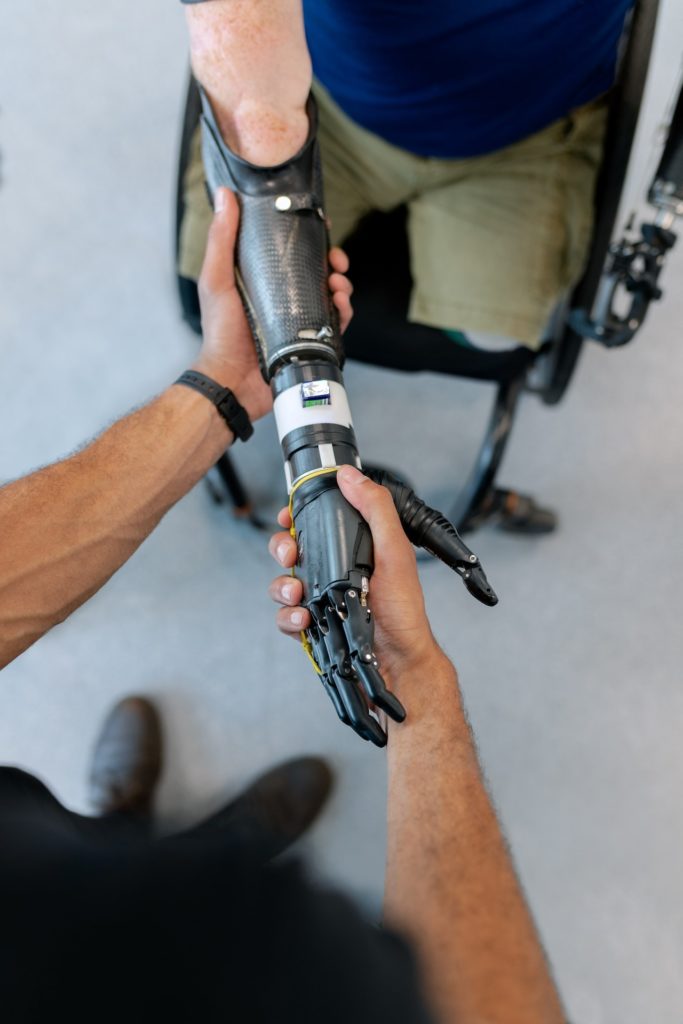
Introduction
Biomedical engineering is an exciting and rapidly growing field that applies engineering principles and design concepts to medicine and biology to develop solutions for healthcare problems.
As a biomedical engineer, you could work on cutting-edge technologies like design prosthetic limbs, artificial organs, regenerative tissue growth, medical devices, drug delivery systems and improved diagnostic equipment.
If you are interested in the intersection of technology, medicine, and innovation, a career as a biomedical engineer may be perfect for you. This comprehensive guide provides key information on what biomedical engineers do, how to become one, education requirements, career outlook, and more. Read on to learn everything you need to launch a rewarding career in biomedical engineering.

Table of Contents
What is a Biomedical Engineering?
Biomedical engineering is an interdisciplinary field that applies engineering principles to medical and biological sciences. Biomedical engineers apply engineering principles and design concepts to healthcare and medicine to advance patient care and improve quality of life.
Some of the major areas that biomedical engineers work in include:
- Biomechanics: Designing prosthetic limbs and body implants
- Bioinstrumentation: Developing medical devices like MRI machines, pacemakers, hearing aids etc.
- Biomaterials: Creating biomaterials like artificial skin, contact lenses, stents etc.
- Cellular, tissue and genetic engineering: Growing tissues and organs, genetic testing
- Medical imaging: Improving medical imaging techniques like CT, PET scans etc.
- Orthopedic engineering: Designing orthopedic implants and prostheses
- Rehabilitation engineering: Developing devices and equipment to assist people with disabilities
Biomedical engineering combines multiple traditional engineering disciplines like electrical, mechanical, chemical, materials and computer engineering with expertise in medicine, biology, and life sciences.
Biomedical engineers collaborate with other professionals like doctors, therapists, researchers, and business personnel to identify needs and design innovative products and techniques. They consider the ergonomics, safety, and costs of their designs.
In essence, biomedical engineers use their technical expertise to research, design, develop, test, and improve the safety and effectiveness of equipment and procedures used in healthcare. Their work directly impacts patient health outcomes and quality of life.
Overall, biomedical engineers aim to improve the quality and effectiveness of patient care through technology. They play a crucial role in integrating engineering with healthcare to help save and improve lives.
What Does a Biomedical Engineer Do?
As a biomedical engineer, you may work on diverse projects across multiple areas, depending on your specialty and place of employment. Here are some of the key job duties and responsibilities:
Biomedical Engineer Job Description
- Consult and collaborate with doctors, therapists, technicians, and other professionals to identify medical technology needs and requirements.
- Research medical problems and technology limitations to devise potential solutions.
- Design, develop and test medical devices like pacemakers, dialysis machines, artificial hips, surgical tools, and other instrumentation and equipment used in healthcare.
- Create computer simulations and computational models of human body systems to analyze and enhance their performance.
- Build prototypes and oversee testing for safety, effectiveness, and regulatory compliance.
- Design advanced medical imaging technologies like MRI scanners, CT scanners, and PET scanners used for medical diagnosis and treatment.
- Develop better prosthetics like artificial legs and arms to improve mobility and quality of life for patients.
- Analyze data and clinical feedback to refine and optimize medical technology products.
- Troubleshooting problems with existing biomedical equipment and systems
- Ensuring designs meet regulatory requirements and quality standards.
- Write reports and present findings to stakeholders on project status, design proposals, and research results.
- Manage product development schedules, budgets, milestones, and team coordination.
- Working with cross-functional teams of technicians, clinicians, sales professionals etc.
- Stay current on technological advances, medical innovations, regulations, and quality standards.
- Provide training and technical support to healthcare staff using biomedical technology products.
- Design healthcare information systems, databases and networks to store, process and monitor medical data.
- Research and develop cutting edge technologies like lab-grown organs, advanced pharmaceuticals, robotic surgeries, gene therapies, neural interfaces, and other emerging healthcare innovations.
- Optimize processes and systems in hospitals and clinics to improve patient care, safety, and outcomes.
- Combine knowledge of engineering with anatomy, biology, and medicine to support clinicians and solve clinical problems.
- Continuous learning to keep up with advancing medical technologies.
Biomedical engineers collaborate closely with healthcare professionals to identify medical technology needs and design innovative engineering solutions. They need to have strong technical knowledge as well as understanding of human anatomy, biology, and medical applications.
In summary, biomedical engineers use their specialized engineering expertise to improve healthcare technologies, devices, systems, and processes with the goal of improving patient diagnosis, treatment, care, and quality of life.
How to Become a Biomedical Engineer?
Becoming a biomedical engineer requires careful preparation. You will need to complete specific education and gain hands-on training. Here are the main steps to start your biomedical engineering career:
Prerequisites to Become a Biomedical Engineer
Biomedical engineering programs require a strong background in mathematics, physics, biology, and chemistry from high school. Courses in anatomy, physiology, trigonometry, algebra, geometry, calculus, biology, physics, and chemistry are highly recommended. Strong computer, technical and analytical skills are also essential.
To become a biomedical engineer, you first need –
- A strong foundation in mathematics, including calculus, differential equations, statistics, algebra, trigonometry, and differential equations.
- Working knowledge of life sciences including human anatomy, physiology, and biology.
- Strong background in physics, chemistry, and computer science.
- Problem-solving skills, critical thinking, and creativity with spatial reasoning abilities.
- Attention to detail and aptitude for technical design work.
- Ability to follow safety protocols.
- Interpersonal skills to collaborate with healthcare teams.
Education Required to Become a Biomedical Engineer or pursue Biomedical Engineering
A bachelor’s degree in biomedical engineering or related engineering field like mechanical, chemical, or electrical engineering is the typical educational requirement to become a biomedical engineer. However, many biomedical engineering roles require a master’s degree or Ph.D. Graduate degrees allow specialization in a field like biomechanics, biomaterials, bioinstrumentation, medical imaging, rehabilitation engineering or bioinformatics.
Typical degree options include:
Bachelor’s Degree
A 4-year bachelor’s degree in biomedical engineering (BME) or bioengineering is the standard entry-level education. Some even pursue a bachelor’s degree in a closely related engineering field like mechanical, electrical, or chemical engineering. But they need to supplement it with biomedical engineering courses, internships, and electives.
The BME curriculum includes a mix of engineering, life sciences, math, and medical courses like:
- Engineering fundamentals – mechanics, thermodynamics, electronics etc.
- Life science courses – cell biology, anatomy, physiology
- Math courses – calculus, differential equations, linear algebra, probability and statistics
- Specialized biomedical and biomechanics courses
- Biomedical engineering electives like biomechanics, biomaterials, bioinstrumentation etc.
- Internships and research projects to get hands-on experience
Master’s Degree
A master’s degree in biomedical engineering takes an additional 1-2 years beyond the bachelor’s program. A master’s degree allows you to specialize further via advanced engineering courses and research. This can expand career prospects in fields like medical devices, artificial organs, bioinformatics, bioimaging, biomaterials, cell engineering, biomechanics etc.
Pursuing a master’s degree allows biomedical engineers to gain expertise in their chosen concentration. It also prepares them to take on more advanced engineering and research roles.
PhD Degree
The PhD is the terminal degree in biomedical engineering and takes roughly 4-6 years after the bachelor’s program. It focuses extensively on original research and results in a dissertation.
Obtaining a PhD allows biomedical engineers to pursue academic research positions and advanced scientific roles. PhDs often become professors, department heads, senior R&D scientists, or project directors.
FAQ
What Degree Do I Need to Become a Biomedical Engineer?
Most entry-level biomedical engineering jobs require a bachelor’s degree in biomedical engineering or a closely related engineering field. Some positions may accept candidates with degrees in biology or life sciences who have relevant engineering skills.
Consider your long-term career goals when deciding on your education.
Higher education like a master’s degree or PhD is often needed for advancing into leadership, managerial, research, and clinical roles. Post-graduate degrees equip you with deeper technical expertise and qualifications.
Some biomedical engineers obtain professional engineering licensure, which requires a degree from an ABET-accredited program, work experience, and passing two exams. Getting licensed demonstrates advanced competency and opens additional career opportunities.
On the other hand, an undergraduate degree may suffice if you want to work as an associate biomedical engineer focusing on design, testing, maintenance, and technical support.
Steps to Become a Biomedical Engineer
Here is an overview of the key steps to start your career as a biomedical engineer:
Step 1: Earn a Bachelor’s Degree in Biomedical Engineering
A BME bachelor’s degree lays the educational foundation covering engineering, life sciences and medical fundamentals. Maintain a high GPA.
Step 2: Complete Internships – Get work experience
Get work experience through co-ops, internships, research projects, or entry-level jobs. This builds your real-world expertise.
Step 3: Consider a Master’s Degree
Pursuing a Master’s after bachelor’s can open up more job opportunities, especially in research and technical specialties.
Step 4: Obtain Licensure
Obtain licensure (optional) through the National Institute for Certification in Engineering Technologies, which involves work experience, exam, application.
Step 5: Build Hard and Soft Skills
Beyond technical skills, develop communication, teamwork, critical thinking and problems solving skills. Stay up to date on medical tech trends. Pursue continuing education through conferences, courses, and certifications to stay updated on the latest technologies and innovations.
Step 6: Create a Strong Resume
Highlight internships, relevant coursework, technical and soft skills. Get your resume critiqued by biomedical engineers.
Step 7: Prepare for Interviews
Read up on commonly asked behavioral and technical interview questions. Review engineering and life science fundamentals.
Step 8: Search Entry-level Job Openings
Search job boards, company websites and network for entry-level openings like associate BME, research assistant, QA/QC engineer etc.
Step 9: Start Your Biomedical Engineering Career
With dedication and perseverance, you can start an exciting and meaningful career improving healthcare through biomedical engineering.
Step 10: Obtain Certifications (Optional)
Certifications like CCE, CQE, CCT demonstrate your knowledge and expertise in aspects like clinical engineering, quality control or imaging technology.
Earn professional certifications to demonstrate expertise in niche areas like biomechanics, clinical engineering, or medical devices.
How Long Does It Take to Become a Biomedical Engineer?
The typical timeframe to become a one is:
- 4 years to earn a bachelor’s degree right after high school
- 2-5 years to gain relevant work experience through internships and entry-level jobs
- 1-5+ years for a graduate degree like a master’s or PhD
So, the quickest route is 4 years for a bachelor’s degree plus 2 years for professional experience. However, many pursue graduate degrees and advanced training, making the total timeline 6-12 years post high school.
Going through an accredited biomedical engineering program with internship experience enables you to meet educational and practice requirements for certification and licensure as well.
Biomedical Engineering Salary
Biomedical engineering is one of the higher-paying engineering fields. Here is an overview of typical biomedical engineer salaries in the United States:
According to the U.S. Bureau of Labor Statistics (BLS), The median annual wage for bioengineers and biomedical engineers was $97,410. The median wage is the wage at which half the workers in an occupation earned more than that amount, and half earned less. The lowest 10 percent earned less than $60,680, and the highest 10 percent earned more than $154,750.
Salary Details for Biomedical Engineer
The median salary for biomedical engineers in the U.S. is $97,410 per year, according to the Bureau of Labor Statistics. However, salaries can vary based on factors like:
- Location – You will earn more working in major metropolitan areas and cities. States like Minnesota, Massachusetts, and California tend to pay higher salaries.
- Experience – Entry-level biomedical engineers with a bachelor’s degree can expect to earn $50,000 – $70,000 per year. With 6-10 years of experience, biomedical engineers can make $80,000 – $130,000. Senior level biomedical engineers with 20+ years of experience can earn $130,000 – $160,000. Advanced positions like research directors can make over $200,000.
- Industry – The medical equipment and pharmaceutical industries pay the highest salaries.
- Position – Advanced roles like R&D director and senior product development engineer command higher salaries.
- To give you a better idea, here are examples of average biomedical engineer salaries in different cities and industries:
- Biomedical engineers in San Francisco earn around $123,000 a year on average.
- In Austin, Texas, the average is approximately $97,000 per year.
- Biomedical engineers working in pharmaceuticals or medical equipment can make $100,000 to $140,000 on average.
- Academic research biomedical engineers earn approximately $85,000 per year on average.
Here are some examples of average salaries for Biomedical Engineering professionals by state:
- California – $101,700
- Texas – $87,060
- Florida – $88,790
- New York – $100,530
- Illinois – $91,130
- Massachusetts – $106,070
- Minnesota – $104,000
- Alaska – $103,650
- New Mexico – $100,980
And by metropolitan area:
- Boston, MA – $105,580
- Chicago, IL – $91,410
- Houston, TX – $86,840
- San Jose, CA – $125,760
- Vallejo, CA – $123,900
- San Francisco, CA – $123,000
- Boston, MA – $117,350
- Minneapolis, MN – $116,620
Salaries also vary by industry:
- Medical device industry – $83,000 – $140,000
- Hospitals – $75,000 – $120,000
- Research organizations – $60,000 – $110,000
- Government – $50,000 – $100,000
Biomedical Engineer Salary FAQ
How Much Does a Biomedical Engineer Make?
Here is a summary of the typical biomedical engineer salary range from entry-level to experienced:
- Entry-level (0-2 years experience): $50,000 – $70,000
- Mid-career (5-10 years): $80,000 – $130,000
- Experienced (15+ years): $120,000 – $180,000
- Late career (20+ years): $150,000+
The highest salaries go to those with a PhD degree and in management, director, or senior R&D roles. Geographic location and industry can also impact salary.
In summary, biomedical engineering is a lucrative field, especially for those able to move up into project lead and management roles. It offers excellent salary growth potential throughout one’s career.
The job outlook for biomedical engineers also looks strong, with a projected 5% growth from 2021 to 2031, faster than the average for all occupations. So you can expect to be in demand and earn competitive compensation in this field.
Biomedical Engineering Schools
Many accredited universities across the United States offer bachelor’s and advanced degrees in biomedical engineering. Here are some of the top biomedical engineering schools:
Best Schools for Biomedical Engineering
| School | Location |
| Johns Hopkins University | Baltimore, MD |
| Georgia Tech | Atlanta, GA |
| MIT | Cambridge, MA |
| University of California Berkeley | Berkeley, CA |
| Stanford University | Stanford, CA |
| University of Michigan | Ann Arbor, MI |
| University of Pennsylvania | Philadelphia, PA |
| University of California San Diego | La Jolla, CA |
| Duke University | Durham, NC |
| Columbia University | New York, NY |
| Georgia Institute of Technology | Atlanta, GA |
| University of Utah | Salt Lake City, UT |
| University of Minnesota | Minneapolis, MN |
| Rice University | Houston, TX |
These schools consistently rank among the best for their state-of-the-art BME programs and research opportunities. They are very selective and admit students with stellar academic backgrounds.
Notable alumni from these top BME programs occupy leading roles at medical device companies, healthcare organizations, research labs and academic institutions worldwide.
When choosing a program, look for an ABET-accredited biomedical engineering bachelor’s curriculum that provides research opportunities and the option to specialize as well as experiential learning opportunities through research and internships. Schools with robust industry partnerships and labs can facilitate hands-on learning.
Also Compare costs, facilities, specializations, and job placement rates of different schools.
Biomedical Engineering Accreditation
For a BME program to receive accreditation, it must meet stringent curriculum, facility and faculty standards set by ABET (Accreditation Board for Engineering and Technology).
It is recommended to graduate from an ABET-accredited program to qualify for important certifications like the Professional Engineering license.
ABET, previously known as Accreditation Board for Engineering and Technology, offers program-specific accreditation for degrees including biomedical engineering.
ABET accreditation is widely recognized by employers and indicates strong technical education.
Over 230 biomedical engineering programs have ABET accreditation across the US. Look for “ABET accredited” or “ABET-accredited program” on a university’s website or promotional materials. Graduating from an ABET-accredited program enhances employability and earning potential.
Graduating from an ABET-accredited program is highly valued and essential for many biomedical engineering roles. It also provides reciprocity for getting licensed/certified in different states.
Biomedical Engineering Colleges
Beyond large research universities and full university programs, many top colleges also offer associate degree programs in biomedical engineering technology or engineering science or biomedical engineering programs, often with more focus on undergraduate teaching.
These 2-year programs prepare graduates for entry-level roles or transfer to a 4-year engineering program. Here are some top ranking community and technical colleges for biomedical engineering:
Best Colleges that offer biomedical engineering programs
| College | Location |
| Renton Technical College | Renton, WA |
| Pensacola State College | Pensacola, FL |
| Moraine Valley Community College | Palos Hills, IL |
| Georgia Northwestern Technical College | Rome, GA |
| Milwaukee Area Technical College | Milwaukee, WI |
| Hudson Valley Community College | Troy, NY |
| Bellevue College | Bellevue, WA |
| Middlesex Community College | Bedford, MA |
| Rose-Hulman Institute of Technology | Terre Haute, IN |
| Cleveland State University | Cleveland, OH |
| Catholic University of America | Washington, DC |
| Milwaukee School of Engineering | Milwaukee, WI |
| Louisiana Tech University | Ruston, LA |
| University of Bridgeport | Bridgeport, CT |
| Cedarville University | Cedarville, OH |
| University of Hartford | Hartford, CT |
These primarily undergraduate colleges provide close faculty mentoring and exposure to real-world projects through co-ops and internships. Class sizes are smaller, allowing for more personal attention.
Graduates from these BME college programs are well prepared for both industry jobs and top graduate/PhD programs. They provide a high-quality biomedical engineering education in a tighter-knit setting.
These colleges offer reputable B.S. programs in biomedical engineering. When researching colleges, look for factors like accreditation, research and lab facilities, industry partnerships, dual degree options, career support services, and scholarship opportunities.
Evaluate public and private institutions across locations you’re interested in. Weigh academics, costs, and other preferences to make an informed decision on the best biomedical engineering college for your goals.
Biomedical Engineering Associate Degree Programs
While a bachelor’s degree is the standard requirement to start a BME career, an Associate Degree can serve as a stepping stone and lead to technician roles.
Some community colleges and technical schools offer 2-year associate degree programs in biomedical engineering technology/technician. The curriculum provides foundational engineering, science, math and medical knowledge.
Courses include topics like instrumentation, biomechanics, medical devices, electronics, anatomy etc. Students also complete a hands-on externship.
With an associate degree, graduates may qualify for entry-level jobs like:
- Biomedical equipment technician
- Biomedical engineering assistant/associate
- Clinical engineer
- Biomedical electronics technician
- Biomedical technician
- Biomedical equipment specialist
While the career advancement is limited compared to a bachelor’s degree, an associate degree provides a quicker and affordable entry into the field. Some also choose to continue their studies and pursue a bachelor’s degree later on.
Online Biomedical Engineering Degree Programs
While hands-on lab work is a critical part of biomedical engineering education, some introductory courses and theory-based content can be learned online. Many accredited universities offer online bachelor’s degrees in biomedical engineering or online engineering master’s degrees with biomedical focuses like bioinformatics or medical device design. Hybrid programs blend online and on-campus study and may be the most practical option for many students.
Online programs provide additional flexibility to earn a biomedical engineering degree, especially for working professionals.
While hands-on lab work is a critical part of biomedical engineering education, some accredited programs are offered online:
- Johns Hopkins University – Post-baccalaureate and master’s degrees in biomedical engineering online.
- Arizona State University – Online MS program with tracks in biomechanics and bioelectronics.
- University of Utah – Online MS program focused on medical device design and commercialization.
- Rensselaer Polytechnic Institute – Online MS in biomedical engineering.
Evaluate program curriculum, capstone projects, career support, and costs when choosing an online biomedical engineering degree. Make sure it provides the technical knowledge, skills, and connections to advance your engineering career.
Can You Become a Biomedical Engineer Online?
Yes, it’s possible to become a biomedical engineer through online education. Accredited schools like Arizona State University, Johns Hopkins, and Penn State offer online BS degrees in biomedical engineering or related fields.
Online programs provide lectures, assignments, projects, and access to faculty via digital platforms. They allow flexible learning for working professionals.
However, keep in mind that some lab sessions or on-campus requirements may apply for online degrees. Carefully review any in-person expectations before enrolling in an online program.
Fully online biomedical engineering bachelor’s degrees are still quite rare since hands-on lab work is a critical part of training.
However, some accredited online master’s programs can facilitate career-changing into biomedical engineering for those with undergraduate engineering or science backgrounds.
Blended approaches with online coursework plus in-person practical lab intensives can also provide flexibility. When researching online biomedical engineering programs, assess clinical training, career outcomes, and costs.
Hands-on clinical experience remains invaluable for biomedical engineering practice. Make sure any online program builds this real-world expertise through in-person elements, project collaborations, or intensive residencies.
How to Become a Biomedical Engineer Online
Here are some tips for becoming a biomedical engineer online:
- Complete prerequisite math, science and engineering courses online
- Enrol in an ABET-accredited online BME bachelor’s degree program
- Take online courses in specialized biomedical engineering subjects like biomaterials, biomechanics, bioinstrumentation etc.
- Complete virtual labs and engineering simulations online
- Do a capstone design project or externship at a local medical facility
- Look for local co-op opportunities or virtual internships to get hands-on engineering experience.
- Ensure online program has dedicated instructor support and career guidance
- Make connections and expand your network via engineering clubs and professional associations.
Once you complete the necessary coursework and earn an accredited online BME degree, you can start applying for entry-level biomedical engineering jobs.
An online master’s degree can similarly help current engineers transition into the biomedical field. But practical experience remains critical, so seek out local opportunities.
In conclusion, online programs can provide a flexible way to gain the foundational education needed to begin a biomedical engineering career. But hands-on practical experience and networking are essential complements.
How to Become a Biomedical Engineer: Final Thoughts
Biomedical engineering integrates technical excellence with meaningful healthcare impact. As a constantly evolving field at the cutting-edge of technology, it presents exciting career opportunities.
Though the educational path requires extensive studies in math, science, and engineering, it opens doors to work on breakthrough medical innovations.
A bachelor’s degree is required to start and a master’s degree allows specializing in fields like biomaterials, bioinformatics or medical device design.
Biomedical engineers get to leverage their technical skills to directly improve patient lives.
Biomedical engineers earn excellent salaries while working to extend human life through technology.
By following the education, training, and experience steps outlined in this guide, you will be well-equipped to excel in this rewarding career field. Stay passionate about innovating solutions that improve patient lives and healthcare outcomes. With dedication and strategic preparation, you can attain success as a biomedical engineer developing life-changing medical technologies.


1 thought on “How to Become a Biomedical Engineer in 2025: A Comprehensive Guide”